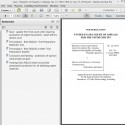 At Cogent, we often work with experts and trial counsel to prepare graphics illustrating and explaining expert opinions. Thus, a new Ninth Circuit decision about the scope of expert discovery in federal court caught our attention. The decision in Republic of Ecuador v. Mackay, No. 12-15572 (9th Cir. Jan. 31, 2014) poses the question: where the expert has served both as a confidential advisor to counsel and as a testifying expert, may counsel withhold documents shared with the expert by asserting an opinion work product objection? The short answer is no—documents from testifying experts must be produced unless protected by Federal Rule of Civil Procedure 26(b)(4).
At Cogent, we often work with experts and trial counsel to prepare graphics illustrating and explaining expert opinions. Thus, a new Ninth Circuit decision about the scope of expert discovery in federal court caught our attention. The decision in Republic of Ecuador v. Mackay, No. 12-15572 (9th Cir. Jan. 31, 2014) poses the question: where the expert has served both as a confidential advisor to counsel and as a testifying expert, may counsel withhold documents shared with the expert by asserting an opinion work product objection? The short answer is no—documents from testifying experts must be produced unless protected by Federal Rule of Civil Procedure 26(b)(4).
In Republic of Ecuador v. Mackay, No. 12-15572 (9th Cir. Jan. 31, 2014), Chevron had withheld documents sought from its experts, asserting that the documents were protected as trial preparation materials under Federal Rule of Civil Procedure 26(b)(3). The trial court rejected Chevron’s position, ruling that Chevron must produce testifying expert documents unless the documents were protected from production by 26(b)(4)(B) (draft reports/disclosures need not be produced) or 26(b)(4)(C) (certain attorney – expert communications protected).
The Ninth Circuit rejected Chevron’s appeal, affirming the trial court decision which allowed discovery. The court observed: “We conclude that Rule 26(b)(3) does not provide presumptive protection for all testifying expert materials as trial preparation materials. The 2010 amendments did not fundamentally restructure Rule 26 to do so.” (Slip opinion at 23).
The decision gives helpful guidance in what can and cannot be safely shared with testifying experts in federal court. As always, attorneys need to think carefully about what they share with testifying experts and what the experts have in their files.
For more analysis of this opinion, I recommend this post from Paul Hastings.
If you’d like to receive updates from this blog, please click to subscribe by email.


